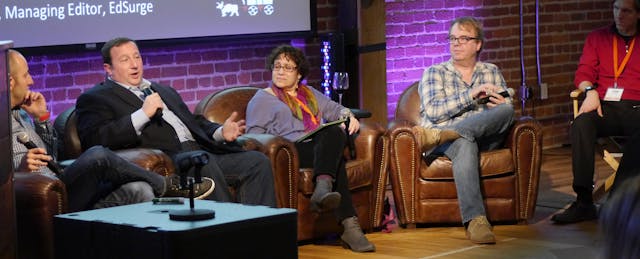Many developers of educational games get waylaid for one reason or another, whether that be lack of funding or slow traction among teachers. But few find themselves brought down by dysentery or a loss of oxen.
On January 15, edtech pioneers came together to discuss research, learning and questions essential to bringing technology games into the classroom: How can developers measure the effectiveness of educational games? Has the education game market become more sustainable for small-scale entrepreneurs? Are you more likely to survive the treacherous Oregon Trail journey if you start as a farmer, or a carpenter?
The panel, “Beyond Oregon Trail: Using Research to Pave the Path to Better Learning Games,” was presented by EdSurge and the Concord Consortium, marking the opening of Concord's West Coast presence. The event, held at GitHub in San Francisco and moderated by EdSurge's Tony Wan, was attended by 120 entrepreneurs, educators and edtech enthusiasts.
Conversation and differences of opinion were lively among the panelists: Chad Dorsey, President and CEO of the Concord Consortium; Michael John, Game Director at GlassLab; Janet Kolodner, former head of the cyberlearning program at the National Science Foundation and a Regent’s Professor at the Georgia Institute of Technology; Ira Sockowitz, Executive Director at Learning Games Network; and Esteban Sosnik, Executive Director at Co.lab.
Expansion Beyond Math Games
Several panelists emphasized how much edtech games have expanded in terms of subject matter, assessment and use since the days of Oregon Trail. Sosnik spoke to the breadth of games now available in the classroom, with games on topics from financial literacy to music theory, in addition to the old stalwarts of math and historical games. John, who hails from the world of commercial gaming as former creative director at Electronic Arts, spoke to how much more fun educational games have become in recent years, adding, “commercial games paved the way.”
“A good video game is a series of meaningful choices,” said John, whether they be right or wrong. That’s what separates a game like Oregon Trail from Math Blaster, where the only choice a player makes is: What’s the right answer? “That choice is not meaningful or interesting. It’s merely an exercise in being correct or incorrect.”
Assessment of Educational Games
As game use in the classroom has become more prevalent, there has been a growing need for effective assessment of student learning. Several panelists spoke to the importance of delivering data that teachers actually use. “If we can push data that is quick and actionable to the teacher and help them see what to do with it, it can be actually used,” explained John.
Dorsey agreed, speaking to the difficulty and need of assessment data. “It’s very easy to make a game that’s fun and doesn’t tell you if someone is learning,” he warned. “Getting that evidence is not a simple thing.”
But simply dumping data on a dashboard isn’t meaningful in and by itself. Jacob Klein, co-founder of Motion Math, expressed worry during the audience Q&A that the level of scrutiny that games are held to when it comes to demonstrating learning may “boil the fun out of it.”
One key in keeping a balance between fun and learning, John responded, is for developers to “turn it around from ‘I’m surveilling you’ to ‘I’m celebrating you through the data.’”
The Future of Educational Games: Lessons from Oregon
Educational games have evolved far beyond the pixelated versions of the 1980s. But there are still lessons to be learned from previous successes. “There’s so much that Oregon Trail did right that we can do more of now,” said Kolodner. She sees the historical computer game as introducing an essential component of effective edtech games: roleplay and personal investment.
“Oregon Trail put people in roles which gave clear constraints, and a sense of real authenticity,” she explained. “Roleplay, in an authentic situation, gives a way to try on being someone else, which is quite different from reading about what something was like.” And with the emergence of online, social gaming communities, she is hopeful for what self-reflection and increased community will bring to the educational gaming experience.
Panelists also were hopeful about developing relationships between entrepreneurs and teachers. “It’s key to create a clear role for the teacher when developing a game,” said Sockowitz. As he sees it, teachers are increasingly interested in playing an active role in choosing the games used in their classrooms.
“More and more, we’re seeing software and content requested by the teachers themselves,” rather than a top-down mandate from districts and administrators about what’s effective, he explained. As educators become more involved in the procurement of educational games, he is optimistic that small-scale developers will be able to build relationships with teachers as their primary consumers and users.
To see more photos and quotes from the event, check out #OERSummit on Twitter.


